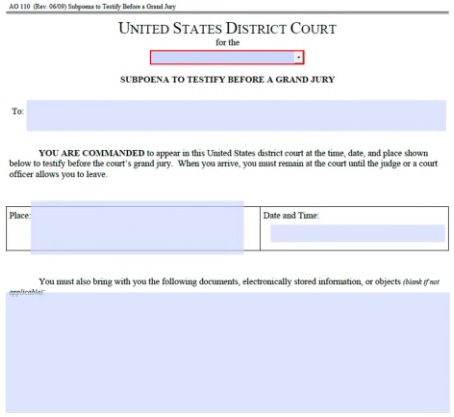
The Grand Jury Wants to Hear From You—Here's What That Means
-
 Eddie R. Mendoza
Eddie R. Mendoza
View Bio
For many professionals, the receipt of a federal grand jury subpoena may be the person’s first encounter with the federal government. If you’ve received a federal grand jury subpoena, take a breath—but don’t dismiss it. These subpoenas are not ordinary. Indeed, the service of a federal grand jury subpoena typically means the federal government—in many instances, the United States Department of Justice—is investigating a potential crime for which the recipient of the subpoena may have relevant information. Whether the federal government sees the recipient as a witness or a potential subject or target of that investigation, the recipient’s response—or lack thereof—can significantly influence the government’s next move.
What is a grand jury?
A grand jury is a body of citizens that determines whether there is “probable cause” to believe that one or more persons has committed a federal crime within a particular geographic region. The government—outside the presence of the person under investigation or any other witness—may present evidence to the grand jury, which then reviews the evidence and determines whether probable cause exists for the government to file formal charges. If the grand jury finds probable cause, then it signs an indictment (formal federal criminal charges). The indictment also initiates the federal court process, which includes various court hearings and potentially a trial.
What is a grand jury subpoena?
One way the government collects evidence to present to the grand jury is by using a grand jury subpoena. The grand jury subpoena is a document served onto a person compelling their appearance to testify before the grand jury or their submission of documents to the grand jury. The government usually reviews documents submitted by the recipient to develop its investigation and presents those documents and other evidence to the grand jury. Other times, the government will ask the recipient questions about the facts under investigation before the grand jury, which is transcribed by a court reporter and may, in some cases, become available at a trial. The use of a grand jury subpoena may thus be crucial in the development of a federal criminal case because it allows the government to seek and preserve evidence before the filing of charges. And in some instances, as an investigation develops or concludes, the government may decide it appropriate to notify a “target” of a grand jury investigation that the person is no longer a target—a quiet success for that subpoena recipient.
Note that a grand jury subpoena is distinct from a subpoena served in a civil case. Although subpoenas in civil cases are also important, this post addresses only subpoenas issued under the power of a grand jury. A federal grand jury subpoena will usually be self-identifiable, as follows:

The Power of the Grand Jury is Broad, But Limited
It’s important to remember that the grand jury’s power “is limited by its function toward the possible return of an indictment.” Justice Manual, Department of Justice, Grand Jury, Section 9-11.120 (citing Costello v. United States, 350 U.S. 359, 362 (1956)). In other words, if the grand jury finds probable cause for formal charges, the government usually may no longer use the grand jury to obtain evidence for the crime that has already been charged by the grand jury. That’s why prosecutors often build their case thoroughly at the grand jury stage—to avoid obtaining an indictment, only to learn later the government lacks evidence to prove its case in the federal court system. Indeed, the federal court system requires a different type of jury—a petit jury—to unanimously vote that the government’s evidence proves that a defendant committed the crime charged beyond a reasonable doubt. This is the highest burden in the American legal system. The government is thus incentivized to develop its case at grand jury to ensure that, if the grand jury returns an indictment, the government will be able to prove its case beyond all reasonable doubt.
Takeaway
Because of how seriously the government treats a grand jury subpoena, it is crucial for the grand jury subpoena recipient to consult an experienced lawyer right away. A lawyer experienced in grand jury work may discreetly ascertain the government’s perception of the recipient and begin developing a strategy, potentially avoiding any indictment and the federal court process altogether. A lawyer may also be able to assist the recipient in responding to the subpoena, which is especially critical considering that disobedience of a federal criminal subpoena or otherwise ignoring one may result in “contempt” of court. Fed. R. Crim. P. 17(g). Moreover, a person compelled to testify before a grand jury may have Fifth Amendment rights to consider before answering any questions—and because their attorney will not be permitted in the grand jury room with them, consulting with an experienced lawyer in advance becomes even more important.
If you have any questions regarding this blog post or any civil or criminal tax matter—or any white collar criminal matter—you may contact me at emendoza@meadowscollier.com or by calling 214.749.2420.
